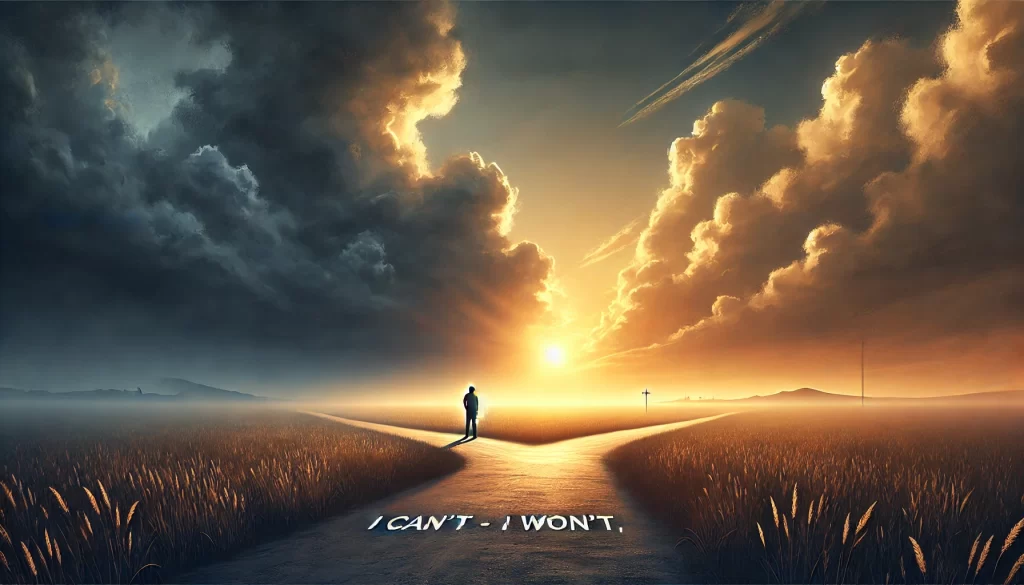
Of late, I’ve been hearing a lot – and in most cases, for reasons well understood – about the collective discomfort that seems to linger in the air: a brooding sense of “things not being right,” a shared perception that the world is drifting, if not in a negative, then in a decidedly wrong direction. It’s not uncommon to hear people articulate this discomfort, yet what strikes me most is what happens when you push the conversation deeper.
Ask a series of “why” questions, and you’ll often find that clarity begins to unravel. Probe just a little further – “But why not do something about it?” – and the responses become even more revealing. It’s not just the hesitations that stand out but the language used to explain them. “I can’t” and “I won’t” appear with remarkable frequency, often used interchangeably, as though they mean the same thing.
The sheer repetition of these phrases left me curious. What lies beneath those words? Is there something deeper in the way they’re used, and more importantly, in the way they shape how we respond to challenges, to opportunities, to life itself? It compelled me to sit down and intentionally reflect on the nuance between the two. What emerged was a recognition that these seemingly small differences in language represent a much larger truth about how we frame our choices – and ultimately, ourselves.
“I can’t” suggests external constraints – time, resources, abilities, or circumstances. It’s a way of signaling that something outside of us has closed the door. In some cases, this is true. There are real limits we face, boundaries we cannot cross. But how often is “I can’t” less about actual impossibility and more about a reluctance to try, a fear of failing, or a lack of clarity about what really matters?
“I won’t,” on the other hand, carries an entirely different weight. It doesn’t always abdicate responsibility; more often it owns it. It’s a statement of intent, a declaration of boundaries, and, perhaps most importantly, a reflection of choice. “I won’t” means there is a reason – a value, a priority, or a belief- that underpins the decision. It may still invite pushback or provoke disagreement, but it leaves little room for ambiguity. It’s a line drawn with purpose, not convenience.
This distinction between “I can’t” and “I won’t” isn’t just linguistic; it’s deeply psychological. “I can’t” is passive, reactive, a narrative where the individual is at the mercy of forces beyond their control. “I won’t” is proactive, deliberate, and reflective of agency. Leaders, for instance, are often defined by which of these phrases they lean on in moments of challenge. A leader who defaults to “I can’t” risks signaling helplessness and indecision, while a leader who says “I won’t” demonstrates clarity, focus, and the willingness to take ownership.
But this isn’t just about leadership; it’s about life. In our personal and professional spheres, the ability to distinguish between “I can’t” and “I won’t” can transform how we approach challenges, opportunities, and relationships. Consider how it feels to tell someone, “I can’t help you.” Now consider how it feels to say, “I won’t help you because I need to prioritize something else.” The former may excuse you, but the latter empowers you. It clarifies your intent and establishes your boundaries without pretense.
The real work lies in examining the “why” behind these phrases. When you say “I can’t,” are you truly facing an insurmountable obstacle, or is it fear, doubt, or discomfort speaking? And when you say “I won’t,” is it rooted in conviction, or are you using it to mask avoidance? This kind of introspection demands honesty and courage, but it also offers immense rewards.
Adaptability and resilience thrive on this clarity. “I can’t” doesn’t have to be the end of the story. It can be a starting point for intent, for problem-solving, for finding a way forward. And “I won’t” doesn’t have to signal rigidity; it can reflect the strength of standing firm in your values.
In the end, these words are more than phrases; they’re mirrors. They reveal how we see ourselves and how we navigate the world. “I can’t” reflects the barriers we perceive. “I won’t” reflects the choices we make. The difference between the two shapes not just how others perceive us but how we define our own agency, leadership, and purpose.
So, as I reflect on the collective discomfort I’ve observed and the frequent responses of “I can’t” or “I won’t,” I realize how deeply this nuance shapes not just individual decisions but our shared experiences. It’s easy to point outward, to expect clarity and decisiveness from others, but harder to recognize where our own language betrays hesitation or avoidance. For me, this reflection is ongoing. Each time I catch myself saying, “I can’t,” I try to pause and ask if that’s really true or if it’s fear or uncertainty speaking. And when I say, “I won’t,” I aim to ensure it’s a conscious choice rooted in my values, not a reflexive dismissal.
Until we confront, within ourselves, the reasons behind our paralysis – the lingering discomfort about all that feels wrong, unresolved, or out of place – I believe that we will remain stuck in a cycle of inaction.
And until we truly appreciate our reasons for saying “I can’t” and “I won’t” to the fundamental question I posed before – “But why not do something about it?” – I contend that we forfeit both the right and the hope to glimpse a silver lining.
In examining these words, I’ve come to see them as tools for shaping not just what I do, but how I live, and I hope this exploration inspires you to do the same.